In El Salvador, rural women plant seeds of independence
In El Salvador, where land ownership still remains a barrier for women, a rural women’s cooperative paves the way for income, access to public services and legal support. A child care facility run by the women enable them to work outside their homes.Date:
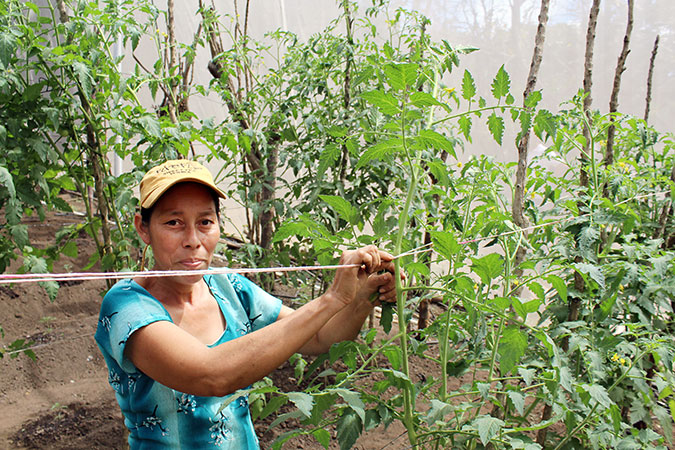
Mercedes Sanchez de Garcia tenses when she remembers how her husband would stop her from participating in the women's association of Las Piedritas, in a rural district in the eastern part of El Salvador: “’You’re not going there,’ he told me. ‘You have to look after the children. That’s what you’re here for.’”
The association then had six women, including her, who had organized themselves as a cooperative to produce and sell vegetables. But Garcia’s husband didn’t want her to work outside the home or be financially independent.
Garcia and her friends persisted in their hope to find a way out of poverty. Las Piedritas is a village of approximately 70 families, located along the fertile slopes of the Chaparrastique volcano. "Before the agrarian reform, all of this land belonged to one of the 14 richest families in the country," explains Beraliz Argueta, social worker of Ciudad Mujer, a Salvadoran government initiative for women’s empowerment.
Land ownership still remains a key issue for rural development in El Salvador, especially for rural women. Over the last 40 years, several land reforms have aimed at reversing the historically unequal land distribution, but progress has been slow and reforms targeted mainly male heads of households. According to the 2007 census, women—52 per cent of the population— were only 11 percent of agricultural holders in El Salvador [1]. By 2014, 38 per cent of the rural population still lived in poverty according to national statistics [2].
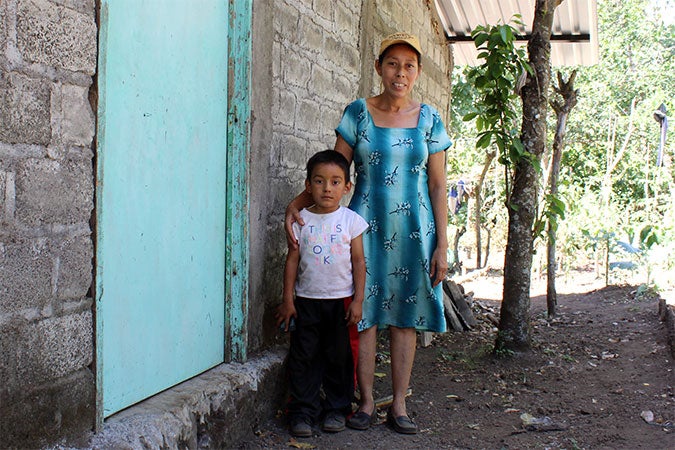
Garcia was 28 and had a daughter from another man when she married her husband, a day labourer, and had two sons with him. She baked tortillas at home and sold them to contribute toward the meagre family income. Her life changed, when during a village development meeting, Ciudad Mujer offered her an opportunity to co-found the women's association. Garcia was excited; she traveled to San Miguel once a week for four months with the association members to participate in an agricultural course sponsored by Ciudad Mujer.
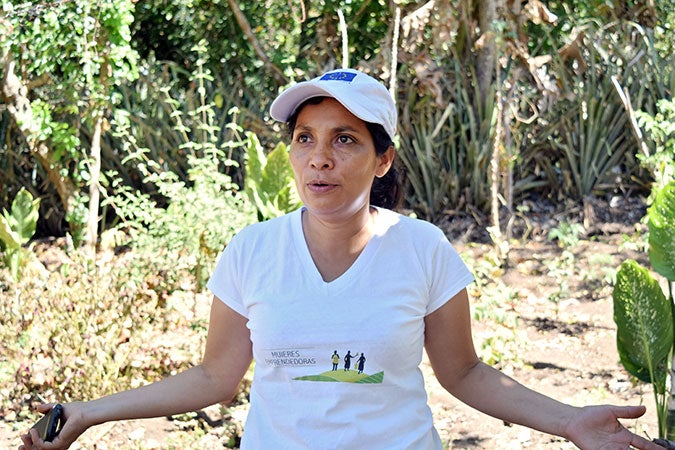
The cooperative they created, called Mujeres en Acción (Women in Action), is one of 26 rural women's groups in El Salvador that UN Women supported with IFAD and Ciudad Mujer to bolster women’s entrepreneurship.
Ciudad Mujer, the government initiative that fostered the women’s association, provides a unique model, which brings together 17 government agencies under one roof, working on economic empowerment, violence prevention and support for survivors, providing sexual and reproductive health and child care services.
In San Miguel, surrounded by flower bushes and fruit trees, groups of women sit and chat in the shade of the open corridors that connect the buildings of Ciudad Mujer. In a country with high levels of crime and insecurity—5.7 femicides per 100,000 women [3], for example—Ciudad Mujer is a sanctuary for women, where they receive quality services for free. Men cannot enter the premises.
"For us, economic empowerment is not about giving women money, it’s about tools to take their own decisions," explains Miriam Bandes, UN Women Programme Specialist in El Salvador. Through the project funded by the International Fund for Agricultural Development (IFAD) , many of the women have received integrated public services for the first time from Ciudad Mujer," she added.
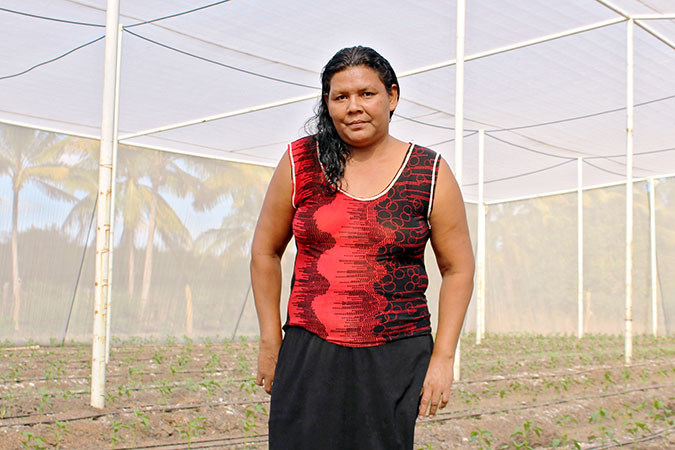
Iris Griselda Gómez, a member of the women’s association, summarizes the experience with Ciudad Mujer as, "We have lifted ourselves up."
Lawyers at Ciudad Mujer helped Mujeres en Acción to secure a free lease over several years to work on a plot. Finding the land was a major accomplishment as none of the members owned land.
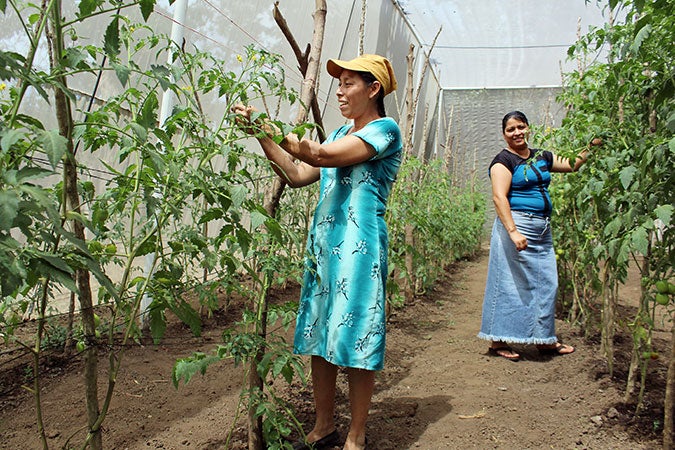
Mujeres en Acción also organized childcare for the cooperative members. "I told the others: I cannot come to work because I have my children," Mercedes Garcia recalls. The members agreed to build a little hut, with the support of UN Women and IFAD, where their children could play. One member always stays there as the others work, to care for the children.
However, Garcia still had an unresolved challenge where her husband was concerned. He continued to threaten her. "In Ciudad Mujer, I learned to defend my rights," says Garcia. When her husband followed through on his threat one day and hit her, Mercedes reported him to Ciudad Mujer and left him to live with her parents.
"It is more difficult for an aggressor to continue committing aggressive acts against a woman who has been empowered and lives a life outside of the home," says Ana Ella Gómez, Director of the Economic Autonomy Module of the Secretariat of Social Inclusion.
Garcia returned to her husband only after he had proved that he was willing to change. "Now you're going to let me go to meetings," she told him. "If not, I will leave you for good."
Today, her husband even helps out on the plot sometimes. "We're doing pretty well," she says happily.
On the plot and in the greenhouse, the women grow tomatoes, peppers and eggplants, enough for their own use and to sell. Their expectations for the next harvest are high, and so are their dreams about what to do with the money they might earn. "I will save to support my daughter so she can finish high school and go to the university—something I wasn’t able to do," says Garcia.
Notes
[1] FAO (2007). Gender and Land Rights Database. Available from http://www.fao.org/gender-landrights-database/country-profiles/countries-list/general-introduction/en/?country_iso3=SLV
[2] Instituto Centroamericano de Estudios Fiscales (2016). Icefi presenta propuesta fiscal para potenciar el desarrollo rural en El Salvador. Available from http://icefi.org/comunicados/icefi-presenta-propuesta-fiscal-para-potenciar-el-desarrollo-rural-en-el-salvador
[3] Economic Commission for Latin America and the Caribbean (2014). Available from http://oig.cepal.org/es/indicadores/feminicidio